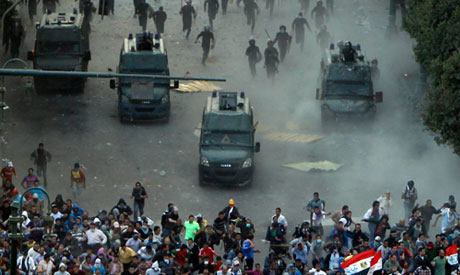
On Friday, President Mohammed Morsi gave a heated speech outside the presidential palace, before an enthusiastic crowd of his supporters, chanting “The people want God’s law,” calling also for the dissolution of the Supreme Constitutional Court. An equally enthusiastic group of Egyptians amassed in Tahrir protesting against a constitutional decree passed by Morsi the day before, granting himself sweeping powers, chanting the same slogans heard almost two years ago: “The people want to bring down the regime.” Today, Muslim Brotherhood headquarters have been stormed or set on fire in several governorates, including major cities Suez and Alexandria.
After the decree was announced, supporters and opponents jumped into action, making their opinions heard, online, on television, and in the streets. Morsi’s supporters defended his move, saying it was a necessary and temporary evil in order to cleanse the judiciary of Mubarak-era corruption. Article 6 which allows the president to pass any decree under the guise of protecting the revolution, national unity and security, was defended as nothing more than a precaution. To date, Morsi has done nothing to justify any concerns that he may abuse this power, they said. A comparison to SCAF’s June power-grab was dismissed with one response – the president was democratically elected, whereas SCAF was a self-appointed leader.
The comparison to SCAF however could still ring true. Democratic elections can only go so far in justifying dictatorial powers. The similarities to SCAF do not end there. In his speech today, Morsi resorted to SCAF-like rhetoric when speaking about protesters in downtown Cairo. He welcomed “a strong and genuine opposition”, adding “the faithful opposition is different from the hired thugs attacking the police right now,” in reference to ongoing clashes in Mohamed Mahmoud Street. He spoke of young children taking money in exchange for attacking the police, an accusation that was made of protesters under Mubarak and Tantawi.
Once again, with Morsi’s decree, Egypt is a nation all but split into two opposing camps. Before the elections that brought Morsi to power, SCAF supporters amassed in Abbaseya, while protesters took to Tahrir’s streets. Today, Morsi’s supporters gather before the presidential palace in Heliopolis, while the opposition once again finds itself in Tahrir, where confrontations continue, with reports of tear gas being fired into the crowds. The Salafist Nour Party has taken something of a middle ground, announcing its support for Morsi’s decree, but questioning the need for article 2, which protects all laws and decrees made by Morsi from any political or governmental body.
Morsi’s speech touched on several key issues. He began by thanking god for “bringing all Muslims together to topple an oppressive regime and for taking us along the path towards democracy, freedom, social justice and stability.” He confirmed that he would not use his powers to reconvene the parliament dissolved by SCAF’s June decree, saying that parliamentary elections would be held. He also defended his decree, saying that he would not abuse his legislative power, nor use it to seek vengeance on any one person or party. Morsi praised a “respectable” judiciary, saying that “It was affected by men who attempted to hide behind it," adding, "I will uncover them."
The speech itself was criticized for its location. His choice to speak from the presidential palace was seen by some, including Wahid Abdel Meguid, a member of the Wafd party and former supporter of Morsi, as a poor choice. “If Morsi wanted to unite Egyptians, he would have addressed the public from a neutral location,” he said. His speech offered an opportunity to address the nation, but left many feeling he was addressing his supporters alone. It also could have been an opportunity to reach out to the opposition he welcomes, for continued dialogue, but appears to have only alienated them further.
While Morsi’s move has divided the nation into two separate camps, the opposition itself is a hodgepodge of political ideologies and movements – united mainly by their opposition to the president, as liberals, leftists, revolutionary movements, and politicians who served in Mubarak’s regime, join hands. In a press conference on Thursday night, standing firm against Morsi’s decree. Hamdeen Sabahi, Ayman Nour, Amr Moussa and Mohamed Elbaradei appeared together decrying what they described as Morsi usurping all state powers. Abdel Moneim Aboul Fotouh also released a statement in opposition to Morsi’s move.
For the time being, Morsi’s opposition seems united. The decree has prompted further withdrawals from the Constituent Assembly, while Morsi’s advisers have also begun to distance themselves from the president. Advisers Samir Morcos and Sakina Fouad have resigned from their positions, both saying they were not consulted prior to the decree’s announcement. However, the opposition must present a plan of action that goes beyond taking to the street in protest or boycotting political process, otherwise Egypt will find itself in a similar if not worse position than it has been in for the past two years, going nowhere fast. At the same time, Morsi has placed himself in a precarious position. Going back on his decision could be perceived as a sign of weakness, particularly as far as the dismissal of Abdel Meguid Mahmoud is concerned, with this his second attempt to rid the courts of the Mubarak-era official.
Photo Credit: Reuters
Image: Tahrir%20November%202012.jpg
